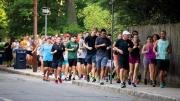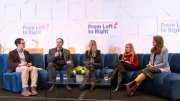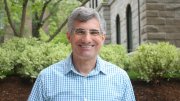The Harvard community learned at least two things about Lawrence S. Bacow during his first year as the University’s twenty-ninth president: he is very much a people person, and very peripatetic. The two are connected.
During a conversation at Massachusetts Hall a couple of weeks after Commencement, Bacow said, “This was a year in which I learned a lot about Harvard.” That is saying something. He first dipped a toe into higher education in Boston by entering MIT as an undergraduate in 1969; earned three graduate and professional degrees at Harvard; had a long and increasingly senior run at MIT; and then presided at Tufts. Beginning in 2011, as a retirement activity, Bacow honed his view of the University from the top, serving as a fellow of the Harvard Corporation. Nonetheless, he said, during the past academic year he scheduled lots of time to get to know people, beginning with faculty and staff members.
Locally, he said, “[I]t was important that I get out and around so that people could get some idea of who this new president is.” Accordingly, he spoke at forums on the economy and on social enterprises at the Business School; a Kennedy School citizenship ceremony; the Radcliffe Institute’s vision and justice “convening”; a summit on gender equity; the Institute of Politics; a School of Public Health gathering; a Medical School conference celebrating an enormous gift; the Harvard Heroes staff-recognition event; and many more formal occasions. Faculty members briefed the president as he prepped for his trip to Asia, and for his presentations across the United States and in Silicon Valley (see below). He engaged spontaneously with proponents of divesting fossil-fuel investments (who aim to reverse University opposition to doing so), and with picketers supporting the graduate-students’ union. And he dropped in on lunch at Annenberg, accepted invitations to dine in the Houses, and welcomed students to join his runs around the Charles River. Of mingling with students, he said, “I hope to do a lot more next year.” Not living on campus, he noted, unlike his former arrangement at Tufts, “means that I have to work harder to engage.”
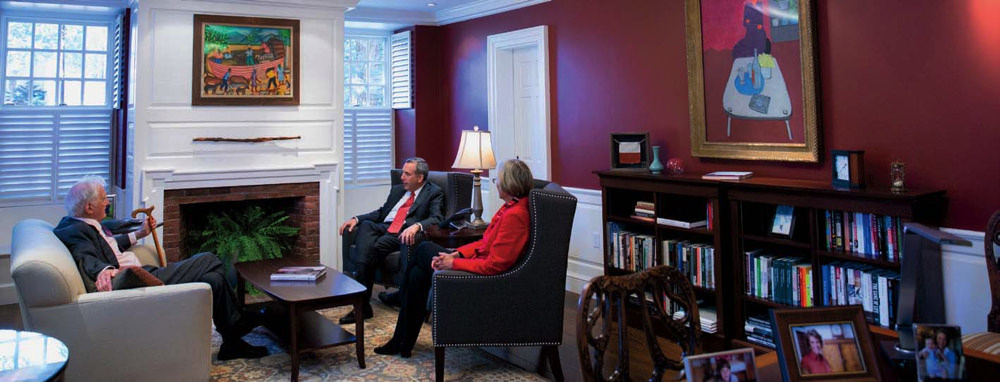
October 4, 2018: Five Harvard presidents appeared at the installaton of Larry 29. The day before, Bacow conversed with immediate predecessors Drew Gilpin Faust and Derek Bok (interim 2006-2007).
Photograph by Stephanie Mitchell/HPAC
In town and farther afield, Bacow invested heavily in meeting “some of our best supporters, our alumni, around the country and around the world.” And how. After an initial alumni gathering in Detroit, he appeared in New York, San Diego, Miami, Phoenix, Houston, and Chicago. He broke bread with the Varsity Club and had a pre-Game reception in Boston. During the winter, he visited London on the way to the World Economic Forum in Switzerland. In March, he attended alumni events in Hong Kong and Tokyo, bracketing an official visit to Beijing (where he met with President Xi Jinping) and a stop in Shanghai. And of course he and many alumni met in Tercentenary Theatre at Commencement, where he hosted German chancellor Angela Merkel.
Alongside those engagements, Bacow had another travel agenda. From the announcement of his appointment in February 2018, he conveyed deep concern about rising criticisms of higher education and eroding public perceptions of the value of college. Accordingly, he traveled widely and often to address the public, showcasing Harvard scholarship in service to society. He spoke with high-school students about the worth of postsecondary education at a meeting in Pontiac, Michigan, his hometown, before appearing at an economic-development forum in Detroit—and unveiling research partnerships with the University of Michigan on opioids and urban poverty and inequality. His San Diego visit showcased a high school’s use of a HarvardX online humanities course, and the Phoenix stop highlighted the University’s partnership with Bloomberg Philanthropies to train mayors nationwide. A separate California trip (he made three during the year) brought faculty members Gary King, Latanya Sweeney, and Alison Simmons together with leaders in Silicon Valley to discuss digital technology, artificial intelligence, and urgent social concerns: privacy, ethical use of algorithms, and the future of work.
That outreach only adds to the president’s expected, and increasingly demanding, role in representing the University and higher education in the political arena. In early summer, Bacow made his seventh trip to Washington, D.C., as Harvard’s leader, during which he has met with about four dozen members of Congress (from both parties) and of the administration. The higher-education agenda encompasses federal support for research and the taxation of endowments, as well as immigration, financial aid, free speech and the diversity of opinions expressed on campuses, and other issues—none of them susceptible of swift resolution.
In conversation, Bacow said he needed to attend to Washington outreach continuously “because so much of the future of higher education rests in the hands of congressional leaders and our government.” From the time of Vannevar Bush’s coordination of research during World War II, spelled out in his 1945 report, Science—The Endless Frontier, Bacow said, the nation has supported a federal partnership with its leading universities. But, he cautioned, “Every so often that partnership is examined, reconsidered, and in some cases, reconstituted.…It feels like this is one such moment.” Airborne members of the community can expect to see their president en route to the capital frequently, because “Harvard needs to be an important part of that conversation.”
Nor will the University go it alone. Bacow has joined the board of the American Council on Education, whose 1,700 members include two- and four-year degree-granting institutions, public and private. It is much broader in scope and reach than, say, the 62-member Association of American Universities. “We can’t afford to be seen as standing apart” from community colleges and other entities, he said. “We are all part of the broader community of higher education” at a fraught time, and so he has made that additional commitment.
As he met with and listened to constituents around the world, Bacow said, “I came to understand and appreciate how much attention people pay to Harvard.” For example, he noted, his March speech at Peking University was immediately downloaded hundreds of thousands of times (see harvardmag.com/bacow-china-19), an outcome he attributed to his role as president. (In the speech, he made the case for academic freedom, with references to both the centennial of the liberalizing May Fourth Movement and a verse by the late Abdurehim Ötkür, widely recognized as a Uyghur—and thus a proxy for the Muslim people under severe repression in western China). “Part of what I’ve experienced this year,” he said, “is coming to understand the power, if you will, of the megaphone that one is privileged to hold as the president of Harvard”—and the accompanying responsibility.
The flip side is the sometimes inordinate attention paid to the University. This year, the spotlight shone on matters ranging from the decision not to reappoint the Winthrop House faculty deans (Bacow deferred to the authority of the Faculty of Arts and Sciences and the College deans when asked about the matter during an FAS faculty meeting) to the trial of the Students for Fair Admissions’ lawsuit alleging that Harvard unfairly discriminates against Asian-American applicants for admission to the College (“Admissions on Trial,” January-February, page 15). Given the unrelated “Varsity Blues” admissions scandal that revealed bribes and test cheating at other schools—heightening scrutiny of admissions at selective colleges—Bacow said, “One of the things likely to shape this coming year is [U.S. District] Judge [Allison] Burroughs’s decision” in the SFFA suit; symbolizing the high stakes, he attended the closing argument.
Turning to matters more directly under the institution’s control, Bacow cited several substantive and intellectual priorities that advanced during the year and may serve to dispel the perception that, as he often puts it, members of elite academic communities are more concerned with making themselves great than making the world better. He pronounced himself “very pleased” with the College’s “Service Starts with Summer” initiative for entering freshmen (harvardmag.com/service-summer-19)—and by the donor response to his call, in his installation address, for funding such opportunities. And based on his discussions with faculty members about their research in rural and “heartland” American venues, he said, it is “fascinating to see how much is going on” there.
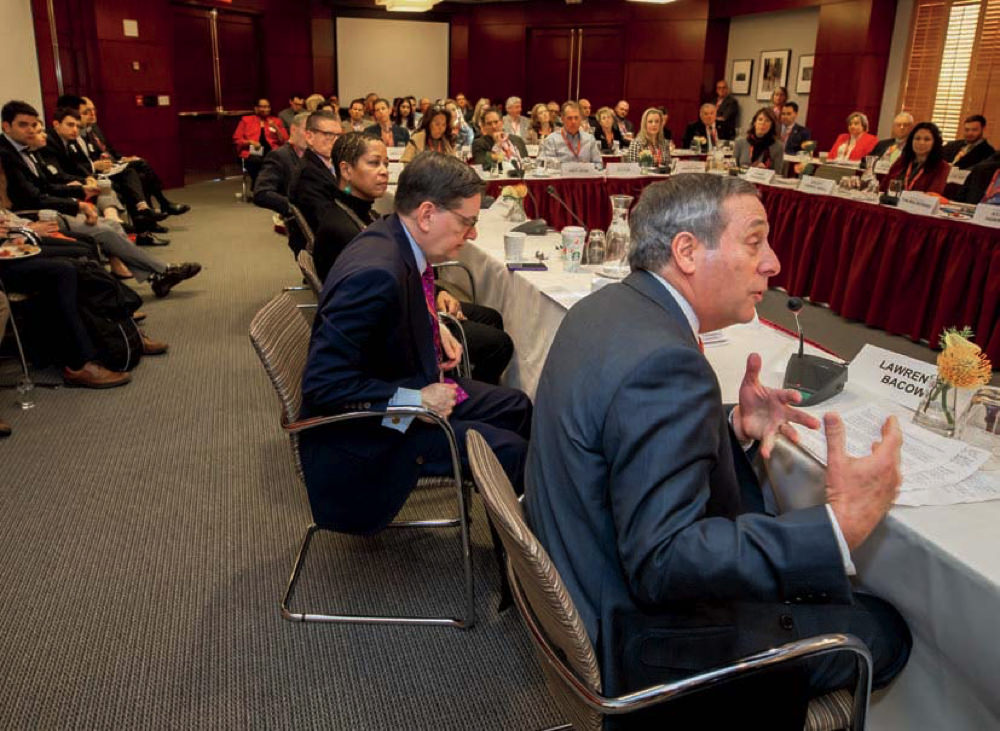
December 5, 2018: Speaking at a breakfast briefing for new members of the U.S. Congress at the Kennedy School
Photograph by Rose Lincoln/HPAC
He has also been “very energized by how people have responded to my talks” in Davos and Silicon Valley “about understanding the second- and third-order consequences of new technologies” like artificial intelligence and machine learning—challenges that span Harvard’s intellectual capital in the schools of business, engineering and applied sciences, government, and law, plus fields like philosophy and units such as the Safra Center for Ethics and the Berkman Klein Center for Internet & Society. One can imagine collaborative research projects with industry, addressing privacy, big data, and, Bacow said, “how these new technologies will change the way in which we work and the way in which we organize work”—both as new opportunities arise and as existing positions are displaced, necessitating retraining and the acquisition of new skills. “We need to be engaged,” he said, “and we will be.”
Similarly, he said, he was “determined to find new ways for Harvard to use its immense resources to respond to the challenges posed by climate change—and there’s a tremendous interest within our community, and an appetite for doing more.”
He also cited “real progress in my drive to partner with other universities,” from the Michigan initiative to local ventures, including prospective projects for graduate-student or faculty housing and, at the frontiers of science, biomedical research facilities and an emerging engagement with MIT on quantum science and engineering. The latter field, Bacow said, feels today much the way life sciences appeared in the 1970s, when scientists had “just started to explore our capacity to sequence and edit the genome”—work that is now finding application in “therapies, drugs, and whole new industries.” In the quantum realm, he said, “It feels to me like we’re in a similar position today”—on the verge of exciting science, to be followed by new technologies and practical applications.
Along with those initiatives in public policy and emerging science, the president emphasized another theme from his installation address that he wished more people focused on, and to which he remains strongly committed. In a world overwhelmed with digitally available information—and misinformation—“I continue to believe that we’re going to see a renaissance of interest in a truly liberal education.” More than ever, that means teaching critical-reasoning skills, helping learners do “more to distinguish the signal from the noise.”
Also within the president’s influence, at least, is securing the resources to advance aspirations as professors articulate them and as the University pursues its institutional interests. During most of his travels for alumni events, Bacow’s schedule set aside time to meet privately with some of those best University supporters: in the aggregate, probably scores of such visits. They seem to be having an effect.
Even with the conclusion of the $9.6-billion Harvard Campaign just before Bacow became president, the Corporation’s senior fellow, William F. Lee, indicated in May that “[I]t was a great fundraising year” (see harvardmag.com/srfellow-update-19). The annual financial report will presumably show the results this fall. Among those already publicized are:
- A $100-million anonymous gift in support of the Faculty of Arts and Sciences (FAS), math, and science, announced last autumn.
- Weeks later, a further landmark gift from Len Blavatnik, M.B.A. ’89, whose foundation gave $200 million to the Medical School (harvardmag.com/hms200mgift-18), and, the week after Commencement, $131 million more for bioengineering from Hansjörg Wyss, M.B.A. ’65.
- And sandwiched in between, $100 million from David E. Goel ’93 and Stacey L. Goel for a new American Repertory Theater facility, a new element in Harvard’s plans for Allston (harvardmag.com/art-allston-19). “I said I wanted to accelerate development in Allston,” Bacow noted. The ART gift will make an impact some years hence (an architect has been named for the project, as reported at harvardmag.com/artallston-architect-19, but additional fundraising, plus design and regulatory review, all are on the horizon). On a faster track, the entity Bacow created last fall to oversee development of the commercial properties opposite the Business School disseminated its request for proposals to private developers in June; a developer for the project may be chosen late this year.
In one sense, after an energetic, even hyperactive, first year of meeting the Harvard community and external constituents worldwide, Bacow’s second year might promise to be more settled. He is again based in Massachusetts Hall (it was undergoing renovation when he took office), and, as of April 2, housed in the president’s residence at Elmwood (which was also being renovated): proximate to campus and the students with whom he hopes to engage more.
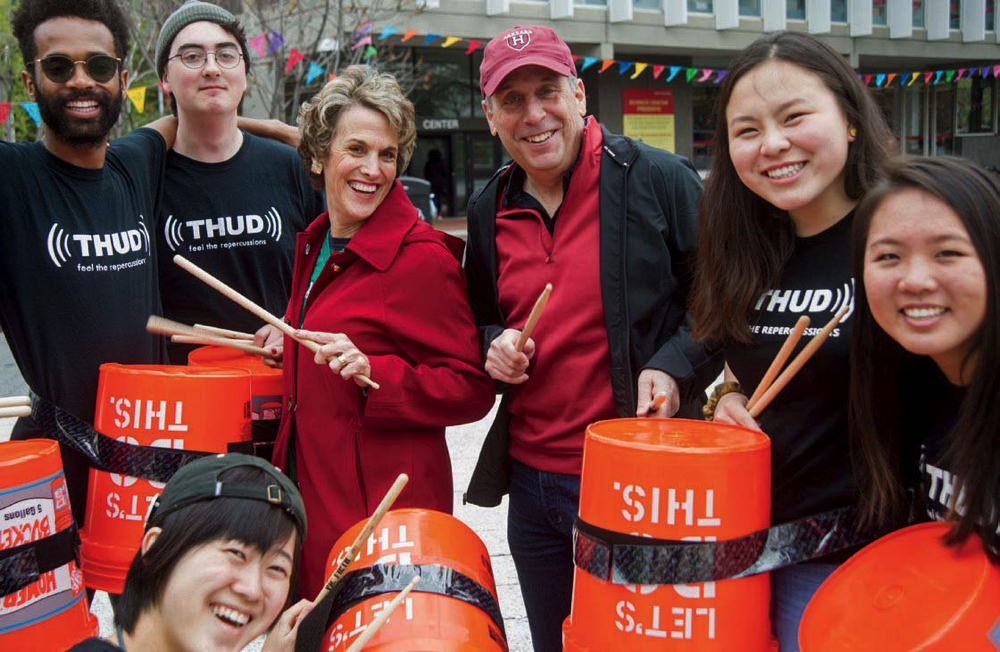
May 4, 2019: The musical Adele Fleet Bacow and Larry Bacow make noise with The Harvard Undergraduate Drummers.
Photograph byJon Chase/HPAC
On the other hand, he expressed no reservations about maintaining a busy travel schedule: “I do anticipate continuing to get out and engage with folks in D.C., and I’ll continue to meet with alumni around the country”—and indeed beyond, including an alumni-association global gathering in Amsterdam this fall, a convenient jumping-off spot for other European cities, too.
Harvard in 2019 is clearly not Tufts in 2001. During his second winter as president there, in 2003, Bacow laid out principles and a strategy for that university, focusing on need-blind undergraduate admission to attract the best students in competition against its best peers; better compensation for and more aggressive hiring of the best faculty members; and belt-tightening elsewhere (a centralized budget with rigorous priority-setting, deferred building maintenance) to pay for the upgrades, along with fundraising.
Harvard, with its vastly larger endowment and tradition of autonomous schools, may not lend itself to comparably unified strategies, or at least not immediately after a stupendous fundraising campaign.
Then again, Bacow may be drawing from other lessons he learned during his first university presidency. At Tufts, he said, “every year was unto itself, often shaped by circumstances that could not be foreseen at the start of the year”—beginning, for him, at the outset of his presidency, with the tragedy of 9/11, and followed later in the decade by the Great Recession. A leader can plan, he said, but not predict.
